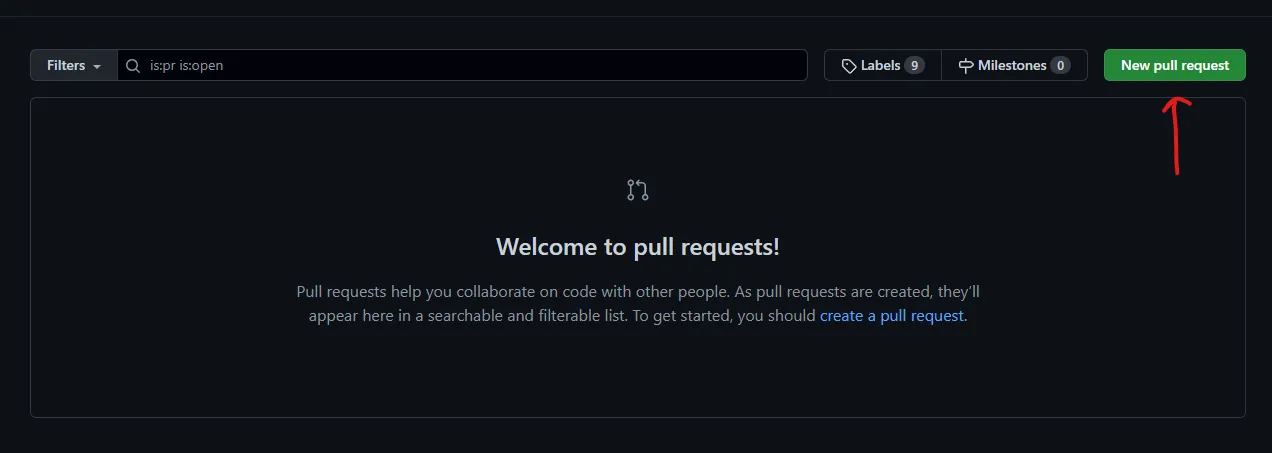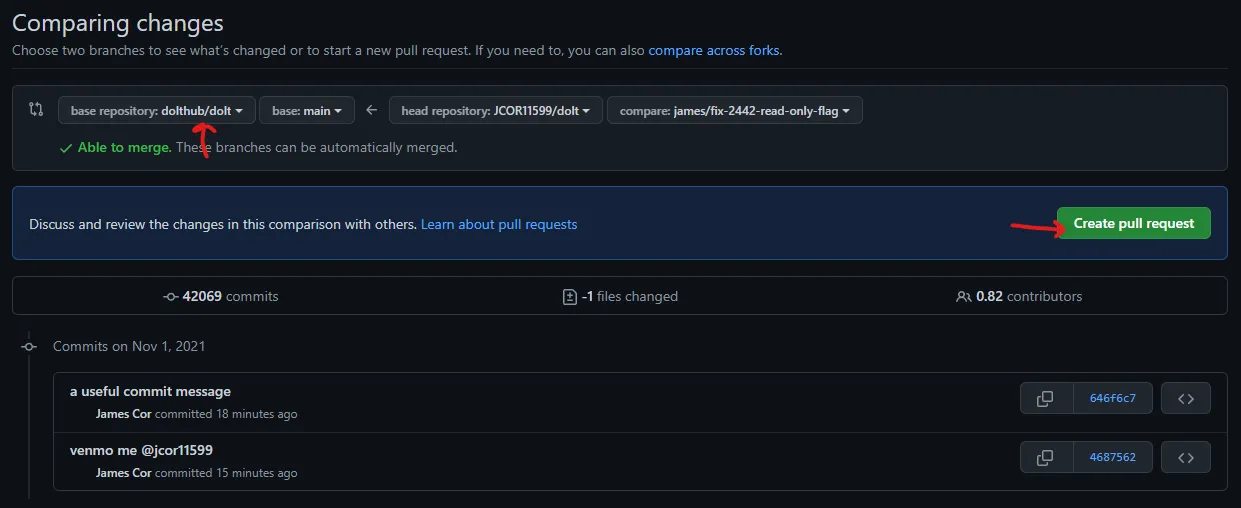whoami#
Hello world! My name is James, and this is my first blog at my first full-time job. I graduated from UCSD a couple months ago with a B.S. in CS, and then got hired as a Software Engineer here at DoltHub. At heart, I’m an engineer; I love to learn, innovate, and solve problems.
If you also enjoy understanding, building, and breaking things you might enjoy contributing to Dolt.
How to Contribute#
Dolt is basically Git for data. We are growing fast and attracting many new users each with their own unique use case. As a result, it is not unlikely we discover that parts of Dolt don’t work as expected. Fortunately, Dolt is open-source, meaning you can tackle any of the issues listed on our issues page on GitHub.
In this blog, I’ll guide you through my recent fix for this bug where Dolt wasn’t respecting a config flag to show you what it’s like to make a change to Dolt.
Setup#
Create a fork of the dolt repo by clicking the fork button at the upper right.
Create a directory for your dolt workspace.
$ mkdir dolt_workspaceClone the dolt project using Git.
$ cd ~/dolt_workspace
$ git clone git@github.com:<your-username>/dolt.gitCreate a branch
$ cd ~/dolt_workspace/dolt
$ git checkout -b james/fix-2442-read-only-flagInstall dolt
$ cd ~/dolt_workspace/dolt/go
$ go install ./cmd/doltIdentifying the Bug#
Dolt has the ability to host a SQL server and take in user queries to create, modify, and drop tables.
The server allows users to provide a config file through the --config option.
A customer claimed that the read_only flag in their config file was not being respected when using the dolt server; this means that the server was allowing users to run queries that modified data on the server.
First off, let’s try to reproduce the issue. Create a dolt database:
$ cd ~/dolt_workspace
$ mkdir test_db
$ cd test_db
$ dolt initCreate a config file named config.yml and put this in it:
log_level: debug
user:
name: dolt
listener:
host: "0.0.0.0"
port: $PORT
behavior:
read_only: trueWe have a file called pytest.py located in ~/dolt_workspace/dolt/integration-tests/bats/helper, which contains many useful helper methods for testing dolt sql-server.
I wrote a quick Python script using methods from pytest.py to send queries and look at the results manually.
from pytest import *
# Create a new connection
dc = DoltConnection(port=3000, database="test_db", user="dolt", auto_commit=1)
dc.connect()
try:
actual_rows, num_rows = dc.query("create table t(a int)", False)
print("no problems")
except BaseException as e:
print('caught exception:', str(e))In one terminal, start the dolt sql-server:
$ dolt sql-server --host 0.0.0.0 --port=3000 --user dolt --config ./config.ymlIn another, run the python script.
$ python sqltest.py
no problemsIn this case “no problems” is actually bad, since we expected the server to return an error.
Fixing the Bug#
I highly recommend using an IDE like Goland especially when debugging larger projects.
After poking around in the code, we see that the config file containing user permissions is used to create a new sqlengine.
serverConf.Address = hostPort
serverConf.Auth = userAuth
serverConf.ConnReadTimeout = readTimeout
serverConf.ConnWriteTimeout = writeTimeout
serverConf.MaxConnections = serverConfig.MaxConnections()
serverConf.TLSConfig = tlsConfig
serverConf.RequireSecureTransport = serverConfig.RequireSecureTransport()
sqlEngine, err := engine.NewSqlEngine(ctx, mrEnv, engine.FormatTabular, "", serverConfig.AutoCommit())For some reason, the NewSqlEngine constructor creates a new authenticator using auth.None, which always gives users full permissions.
Instead, we should be passing in the authenticator already created that is based on permissions specified in the config file.
// NewSqlEngine returns a SqlEngine
func NewSqlEngine(
ctx context.Context,
mrEnv *env.MultiRepoEnv,
format PrintResultFormat,
initialDb string,
+ au auth.Auth,
autocommit bool) (*SqlEngine, error) {
- au := new(auth.None)The method call to NewSqlEngine now looks like this:
sqlEngine, err := engine.NewSqlEngine(ctx, mrEnv, engine.FormatTabular, "", serverConf.Auth, serverConfig.AutoCommit())Testing#
After reinstalling dolt and running the python script, we get an exception as expected.
$ python sqltest.py
caught exception: 1105 (HY000): not authorized: user does not have permission: writeA better way to test this is to use a bats tests, which are located in ~/dolt_workspace/dolt/integration-tests/bats.
You can install bats through npm
$ npm install -g batsThis test basically creates a config file (with the read-only flag set to true), starts a dolt sql-server using the config file, sends a query to create a table, and checks to see if that table was created. So, it’s an automated way to do everything we did earlier.
@test "sql-server: read-only flag prevents modification" {
skiponwindows "Has dependencies that are missing on the Jenkins Windows installation."
cd repo1
DEFAULT_DB="$1"
let PORT="$$ % (65536-1024) + 1024"
cat >config.yml <<EOF
log_level: debug
user:
name: dolt
listener:
host: "0.0.0.0"
port: $PORT
behavior:
read_only: true
EOF
dolt sql-server --host 0.0.0.0 --port=$PORT --user dolt --config ./config.yml &
SERVER_PID=$!
wait_for_connection $PORT 5000
# No tables at the start
run dolt ls
[ "$status" -eq 0 ]
[[ "$output" =~ "No tables in working set" ]] || false
# attempt to create table (autocommit on), expect either some exception
server_query repo1 1 "CREATE TABLE i_should_not_exist (
c0 INT
)" "" "not authorized: user does not have permission: write"
# Expect that there are still no tables
run dolt ls
[ "$status" -eq 0 ]
[[ "$output" =~ "No tables in working set" ]] || false
}Then, I ran the test using this shell script placed in the ~/dolt_workspace/dolt directory:
#!/bin/bash
cd go/cmd/dolt && go install . && cd -
cd go/cmd/git-dolt && go install . && cd -
cd go/cmd/git-dolt-smudge && go install . && cd -
cd go/store/cmd/noms && go install . && cd -
cd integration-tests/bats && bats sql-server.bats && cd -As expected, this test passes.
$ test.sh
...
✓ sql-server: read-only flag prevents modification
...Create a Pull Request#
Since the changes seem to be working locally, make a commit and push to your repo.
$ git add .
$ git commit -m "read_only flag is no longer ignored"
$ git push --set-upstream origin james/fix-2442-read-only-flagFinally, I created a pull request from my fork to the main branch.
Navigate to the pull requests section of your repo: https://github.com/<your-username>/dolt/pulls.

Click on “New pull request”

Make sure the base repository is set to dolthub/dolt and click “Create pull request”.

This will trigger the continuous integration tests to run, which makes sure the changes don’t break any existing functionality. If all goes well, somebody on the Dolt team will review the changes, and they’ll be approved and merged.
Use Dolt#
If you don’t want to fix bugs, you can contribute to Dolt by just using it! Come to our Discord and tell us your use case, ask questions, suggest new features. Chat with our team and some guy named Tim.
See y’all at the issues page.